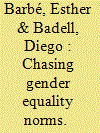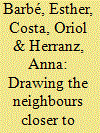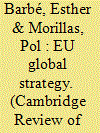|
|
|
Sort Order |
|
|
|
Items / Page
|
|
|
|
|
|
|
| Srl | Item |
| 1 |
ID:
191958


|
|
|
|
|
| Summary/Abstract |
This article studies Sexual and Reproductive Health and Rights (SRHR) at the United Nations (UN). SRHR, a gender equality norm that applies human rights to sexuality and reproduction, have traditionally been supported by a network of actors led by the United States (US) and the European Union. Nevertheless, a rival network has contested SRHR since their conception in the early 1990s. We study the robustness of SRHR in five UN fora between 2009 and 2020, focusing on actor constellations, productive power and norm concordance. Between 2009 and 2016, the normative status quo was maintained, except in the Human Rights Council and the Security Council. In 2017, the US joined the network of rivals and accelerated the norm’s weakening in the Security Council and the Commission on Population and Development. However, to weaken or strengthen the norm further, both networks see a need to address SRHR outside the UN.
|
|
|
|
|
|
|
|
|
|
|
|
|
|
|
|
| 2 |
ID:
092877


|
|
|
|
|
| Publication |
2009.
|
| Summary/Abstract |
The European Neighbourhood Policy (ENP) launched in 2004 was purposefully conceived as a strategy to encourage neighbours' approximation with the European Union (EU). This aim by the EU to extend its own system of rules beyond member states has become the focal point of the literature on the EU's relations with neighbours. In this article, however, we aim to broaden the scope of the analysis of the EU's role as it pursues policy convergence in the ENP area. More specifically, we argue that the convergence processes can be established on a basis other than EU's norms, namely, international and bilaterally developed norms. Building on this three-fold distinction, we propose a model explaining how and when policy convergence is more likely to happen on the basis of every one of these norms. The model takes into account three variables: the structure of incentives between the EU and its neighbours, mutual perceptions of legitimacy and intra-EU coherence. Based on a number of empirical examples, we illustrate that EU-based convergence is less predominant in EU's relations with its neighbours than it is usually portrayed in the literature.
|
|
|
|
|
|
|
|
|
|
|
|
|
|
|
|
| 3 |
ID:
170609


|
|
|
|
|
| Summary/Abstract |
The European Union (EU) has been portrayed as a force for good in the international system. However, due to systemic changes in the international environment and the crises of European integration, its role in the world is becoming more contentious. This paper applies the politicization literature to EU foreign policy and, using the case of the EU Global Strategy (EUGS), questions the effects of emerging politicization for EU political integration. The paper analyses how the EUGS has downscaled the transformative ambition of EU foreign policy, showcasing an adverse framing of its strategic narrative. However, it also argues that this narrative has been accompanied by more integrationist practices, as shown by the institutional developments during the making of the EUGS and its implementation in security and defence. The paper concludes that the effects of emerging politicization in EU foreign policy can simultaneously reflect a less transformative narrative but lead to more integrated practices and policies.
|
|
|
|
|
|
|
|
|
|
|
|
|
|
|
|
|
|
|
|
|